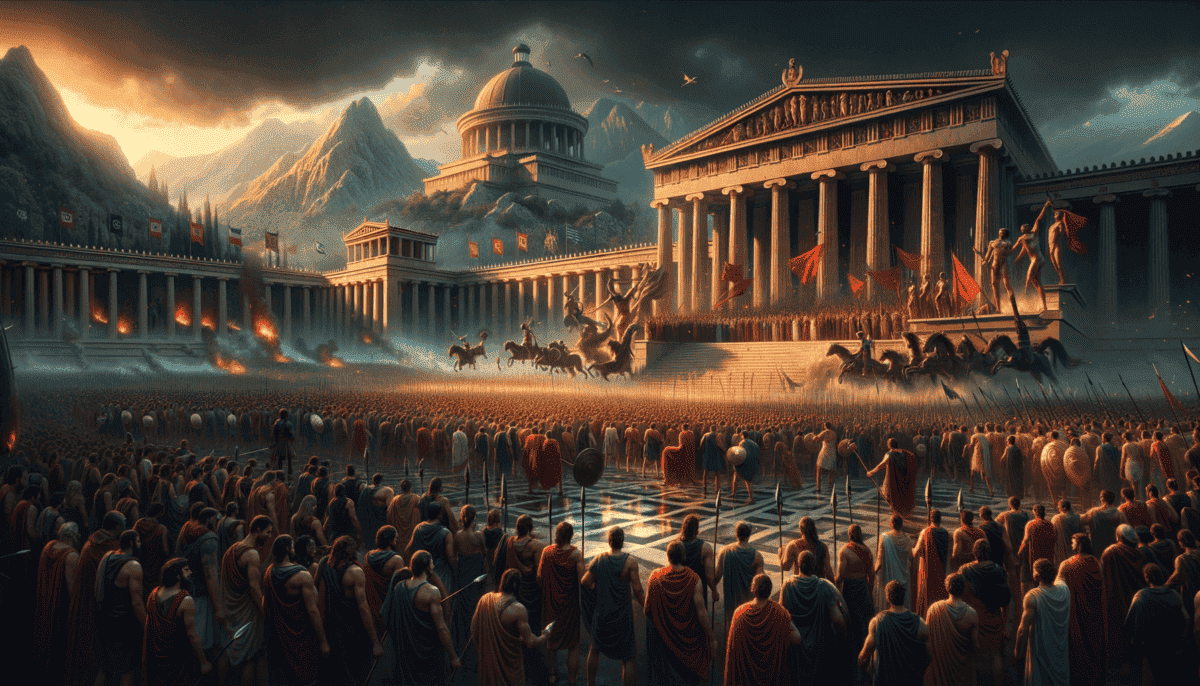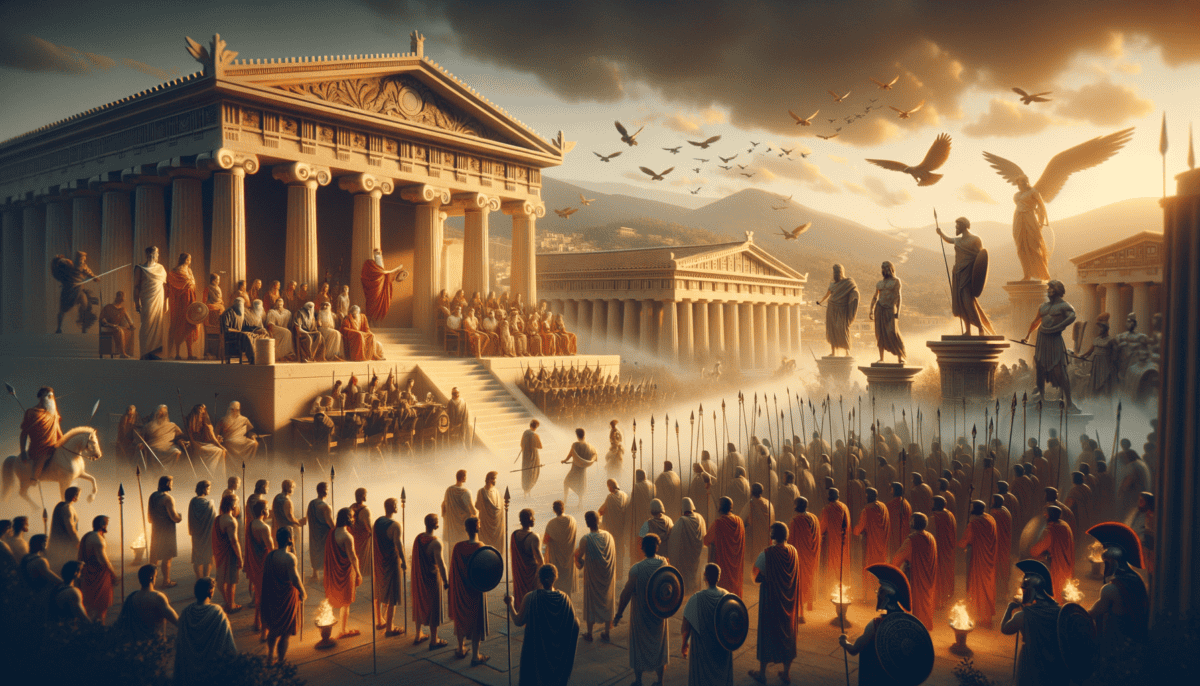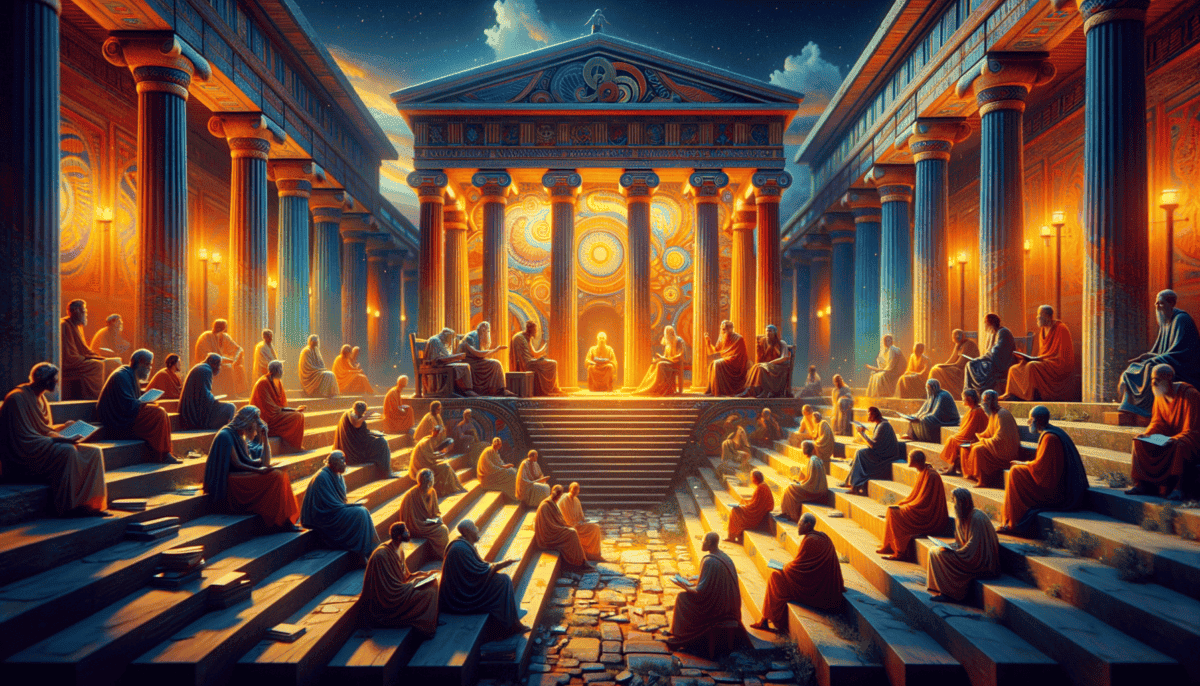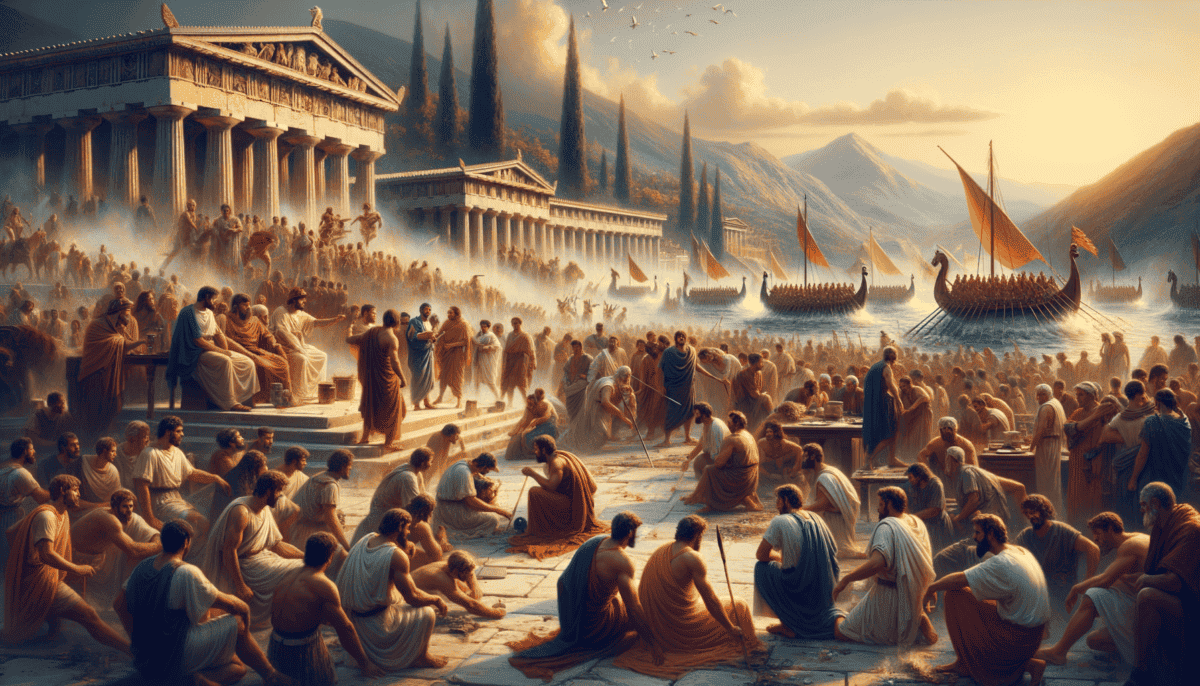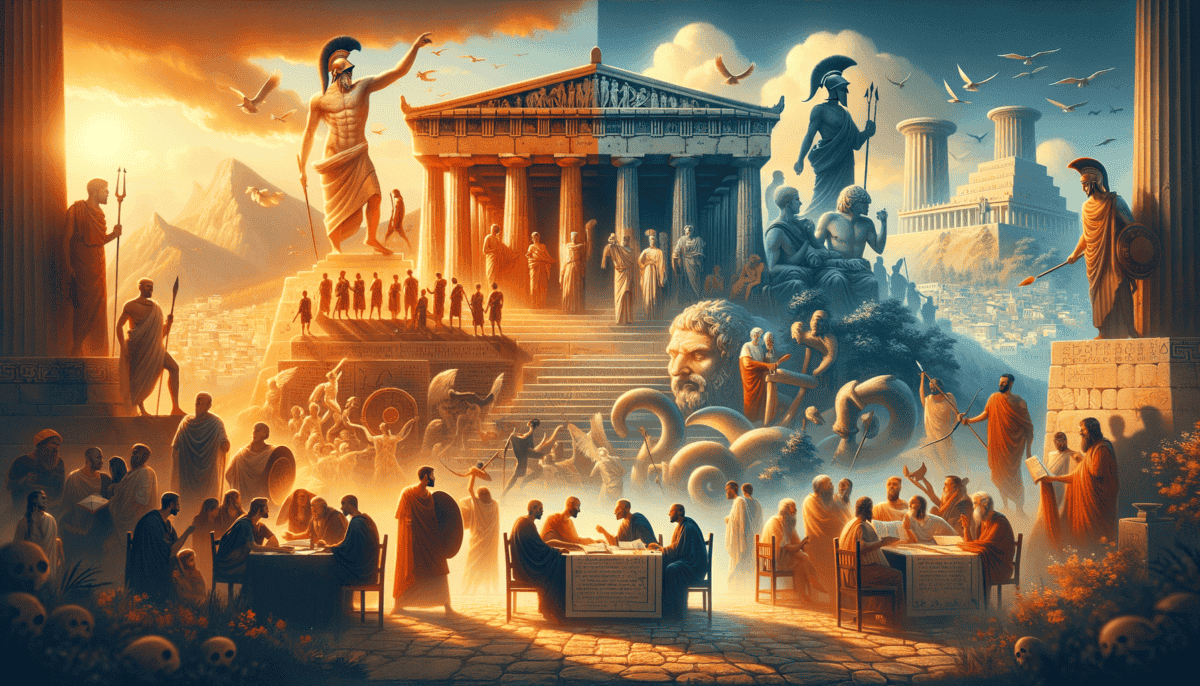The Birth of a Bold Idea
Long ago, in a city called Athens, something amazing happened. The people were tired of having kings tell them what to do. They wanted to try something new – they wanted everyone to have a say! ️
Little Theo ran through the bustling streets of Athens, his sandals clicking against the stone paths. The marketplace was full of people talking about big changes coming to their city.
"Father, why is everyone so excited today?" Theo asked, tugging at his father's tunic.
His father smiled. "Because today, my son, we are making history. A man named Cleisthenes has a new idea about how our city should be run."
Theo watched as people gathered in groups around the Agora – the big meeting place in the middle of Athens. Some were farmers, others were craftsmen, and there were even merchants from the port. They all had something to say!
"But how can everyone have a say?" Theo wondered aloud. "Won't it be too noisy with everyone talking at once?"
His father laughed and explained how Cleisthenes had divided the city into smaller groups called "demes." Each group would pick people to speak for them. It was like choosing team captains for a game, but these captains would help make rules for the whole city!
The people of Athens called this new way of doing things “demokratia” – which means “power of the people.” ️
A New Way of Doing Things
Cleisthenes made some big changes:
• Every free man could vote
• People met regularly to make decisions together
• Important choices were made by counting votes
• Leaders were chosen by the people, not born into power
• Regular citizens could serve as judges and officials
This was the first time in history that so many people got to help make decisions about their city!
Theo spent the rest of the day watching as people practiced their new rights. They used small pieces of pottery to vote – like counting shells in a game. Some votes were about building new temples, while others were about making laws to keep the city safe.
"Father," Theo said as the sun began to set, "will I get to vote one day too?"
"Yes, my son. When you grow up, you'll help make Athens even better. That's what democracy means – everyone working together to build a better future."
As night fell over Athens, Theo couldn't stop thinking about all the changes happening in his city. He imagined growing up and having his own voice in the assembly, just like the proud citizens he saw today.
Little did Theo know that this bold new idea would change not just Athens, but the whole world. The spark of democracy that started in his city would grow into a flame that would light the way for people thousands of years into the future.
That night, as Theo drifted off to sleep, he dreamed of the day when he too would stand up and let his voice be heard in the great democracy of Athens.
Power and Pride
While Athens tried democracy, other Greek cities had different rulers. Some were good, some were not so good. Let’s meet one of the most famous rulers – Peisistratus!
The sun rose over Athens as young Marina sat with her grandmother in their courtyard. “Tell me about the time before democracy,” Marina asked, her eyes wide with curiosity.
“Ah, child,” her grandmother smiled, “let me tell you about Peisistratus, the clever tyrant who ruled Athens before you were born.”
The Clever Ruler
Peisistratus was very smart about getting power. He did something very funny – he rode into Athens in a chariot with a tall woman dressed as Athena, the city’s favorite goddess!
“But grandmother, wasn’t that tricking people?” Marina asked.
“Yes, little one. But here’s what’s interesting – once he became ruler, he actually did many good things for Athens:”
- He helped poor farmers get land
- He built beautiful buildings
- He made sure everyone had clean water
- He started big festivals for the gods
- He made Athens very rich through trade
Even though he wasn’t chosen by the people, Peisistratus tried to be a good ruler. But not all tyrants were like him!
Different Cities, Different Rules
Marina learned that each Greek city had its own way of doing things. Some had kings, others had groups of rich people in charge. It was like each city was playing by different rules!
“But which way is best?” Marina wondered aloud.
Her grandmother patted her hand. “That’s the big question, dear one. Even today, cities and countries try to figure that out.”
As they talked, they could hear the sounds of the assembly meeting nearby. People were voting and discussing important things about their city.
The Price of Power
Marina learned about other tyrants too. Some were good at first but then became greedy. Others were scared of losing their power and became mean. It was like having too many sweets – too much of anything, even power, isn’t good!
“What happened to all the tyrants?” Marina asked.
“Most of them didn’t last,” her grandmother explained. “People learned they liked having a say in how their city was run. They didn’t want just one person making all the decisions.”
As the day went on, Marina watched people going about their business in the city. Some were heading to vote, others were trading in the market, and everyone seemed to have a voice.
The sun was setting when Marina hugged her grandmother. “I’m glad we can all help make decisions now,” she said.
Her grandmother smiled. “Yes, dear one. But remember – having power means being responsible. Whether you’re one ruler or many citizens, what matters most is doing what’s best for everyone.”
Warriors and Heroes
The morning sun sparkled on bronze shields as young Leonidas watched the Spartan warriors train. His heart beat faster with every clash of their swords. ️
“One day, I’ll be strong like them,” he whispered to his friend Thea, who sat beside him on the stone wall.
Life in Sparta
Sparta was very different from other Greek cities. Here, being brave and strong was the most important thing. Every day, boys trained to become warriors.
“Tell me about the brave 300,” Thea asked her grandfather, an old warrior who loved sharing stories.
The old man’s eyes lit up. “Ah, the greatest tale of bravery in all of Greece! Let me tell you about King Leonidas and his warriors.”
The Brave Three Hundred
He told them about the time when a huge army from Persia came to attack Greece. The Persian army had thousands and thousands of soldiers – more than all the stars in the sky!
But King Leonidas and his 300 Spartan warriors weren’t scared. They stood strong at a narrow path called Thermopylae. ️
- They fought for three whole days
- They protected Greece from the huge army
- They showed amazing bravery
- They never gave up
- They became legends forever
Heroes Among Us
“But being a hero isn’t just about fighting,” the grandfather explained. “It’s about being brave enough to do what’s right, even when it’s hard.”
Thea looked thoughtful. “So you don’t have to be a warrior to be brave?”
“That’s right,” smiled the grandfather. “Bravery comes in many forms. Sometimes it’s standing up for a friend, or telling the truth when it’s scary.”
Stories of Courage
As the sun began to set, more children gathered to hear stories about Greek heroes. They learned about Achilles, who was super fast and strong. They heard about Hercules, who did amazing things to help people.
Each story taught them something important about being brave and doing what’s right.
Young Leonidas stood up straighter. “I want to be brave like the 300,” he declared.
Thea nodded. “And I want to be brave in my own way,” she added.
The old warrior smiled at them both. “That’s the spirit! Being brave isn’t about being perfect – it’s about trying your best and never giving up.”
As stars began to twinkle above Sparta, the children walked home, dreaming of heroes and wondering what kind of brave things they might do tomorrow.
Wise Teachers of Greece
The sun was rising over Athens as young Sophia walked through the busy marketplace called the Agora. She loved watching people gather to share ideas and learn new things.
Meeting the Teachers
“Look!” Sophia pointed excitedly. “There’s Socrates talking to people again!” Under a shady olive tree sat an older man with a white beard, surrounded by curious listeners.
“Why do birds fly?” Socrates asked the crowd. “Why does the sun rise every day?”
Sophia listened as people shared their ideas. She loved how Socrates made everyone think harder about things they saw every day.
The School of Thinking
Near the olive tree, Sophia saw Plato teaching his students. Plato was Socrates’ best student, and now he had his own school called the Academy.
“What makes something good?” Plato asked his students. “What makes someone wise?”
Learning from Nature
Later that day, Sophia visited Aristotle’s school. He was different from the others because he loved studying plants, animals, and stars.
- He watched how plants grew
- He learned about animal behavior
- He studied the night sky
- He wrote down everything he learned
- He taught others to observe carefully
Wisdom for Everyone
The marketplace buzzed with excited voices as more people came to learn. Rich and poor, young and old – everyone could join in the discussions.
“Knowledge is like a torch,” Aristotle told his students. “When you share it with others, it grows brighter instead of dimmer.” ✨
Growing Wisdom
As the day went on, Sophia watched people drawing shapes in the sand, counting stars, and talking about how to make their city better.
“Why do you ask so many questions?” she finally asked Socrates.
He smiled kindly. “Because the more we think and ask, the wiser we become. And wise people make better choices for everyone.”
The sun was setting when Sophia headed home. Her head was full of new ideas and questions. She couldn’t wait to come back tomorrow to learn more from the wise teachers of Athens.
These teachers helped make Athens a special place where new ideas could grow. Their wisdom still helps us think and learn today!
Battles That Changed Everything
The morning sun glinted off thousands of bronze shields as Greek warriors lined up along the beach. Young Alexandros watched from a hillside, his heart pounding with excitement. Today, he would see how battles could change the whole world! ️
The Great Sea Battle
“Look at all our ships!” Alexandros whispered to his friend Helena. Hundreds of Greek boats bobbed in the blue waters of Salamis.
The Persian army had many more ships, but the Greeks had a clever plan. They would fight in the narrow waters where their smaller, faster boats had the advantage.
Standing Together
“Why are all the Greek cities fighting together?” Helena asked.
An old sailor nearby smiled. “Because we’re stronger when we work as one! Athens, Sparta, Corinth – we’re all Greeks today.”
The battle was amazing! Greek ships zipped between the bigger Persian boats. By sunset, the Greeks had won a great victory!
The Young King’s Dreams
Years later, a young king named Alexander had big dreams. He wanted to explore the whole world and share Greek ideas with everyone he met.
Making New Friends
Alexander didn’t just fight battles – he made friends too! As his army moved east, they:
- Built new cities
- Learned new languages
- Traded with different people
- Shared Greek ideas
- Made new discoveries
A Bigger World
“What’s the most important thing you learned?” a young soldier asked Alexander.
“That the world is bigger and more wonderful than we ever knew,” Alexander replied. “And there’s room for all of us to share it!” ⭐
Lasting Changes
Back in Athens, Alexandros and Helena were now grown up. They watched their children play with toys from Persia and Egypt.
“The world feels so much bigger now,” Helena said, smiling.
“And better too,” Alexandros added. “Because now we know more people and understand more things!”
The stars twinkled above them like tiny ships in a vast sea. Thanks to brave warriors and curious explorers, the Greek world had grown bigger than anyone had ever dreamed!
Ideas That Changed the World
Little Maria sat on the steps of the Parthenon, watching the sunset paint Athens in golden light. “Grandpa, tell me again how our ideas helped shape the whole world!”
Seeds of Democracy
“Well,” Grandpa smiled, “it all started right here in Athens. Remember how we learned about people voting and having a voice?”
“Those ideas were like tiny seeds that grew into big trees. Now, all around the world, people gather to make decisions together, just like we did!”
Wisdom That Lives Forever
Maria picked up a small stone from the ground. “What about all those smart people who used to think big thoughts here?”
The old philosophers taught us to ask questions and think carefully about everything. Their words still help people learn today!
Grandpa pointed to a group of students sitting in a circle nearby, deep in discussion. “See? Just like Socrates and his students, people still gather to share ideas and learn from each other.”
Stories That Never Die
“The best things about Greece,” Grandpa said, “weren’t the buildings or battles. They were the ideas that helped people understand each other better.”
Greek Gifts to the World
Here are some wonderful things the Greeks gave to everyone:
- Ways to make fair decisions together
- Love of learning and asking questions
- Beautiful stories and art
- Ideas about being brave and wise
- Dreams of making the world better
A Living Legacy
“Look around,” Grandpa said softly. “In schools, in meeting places, in stories – Greece is still alive everywhere!”
Maria watched as lights began twinkling across Athens. “It’s like the stars,” she said. “Our ideas keep shining, even after all this time!” ⭐
Forever Growing
As the moon rose over the ancient city, Maria hugged her grandfather. “Our story isn’t over, is it?”
“No, little one,” he smiled. “As long as people dream big dreams and share good ideas, the spirit of Greece will keep growing. Just like you!”
And so, the amazing story of Greece continues through everyone who believes in wisdom, courage, and working together to make tomorrow better than today.


